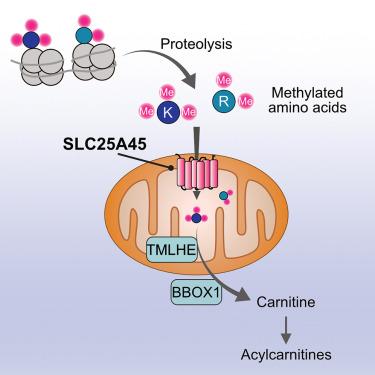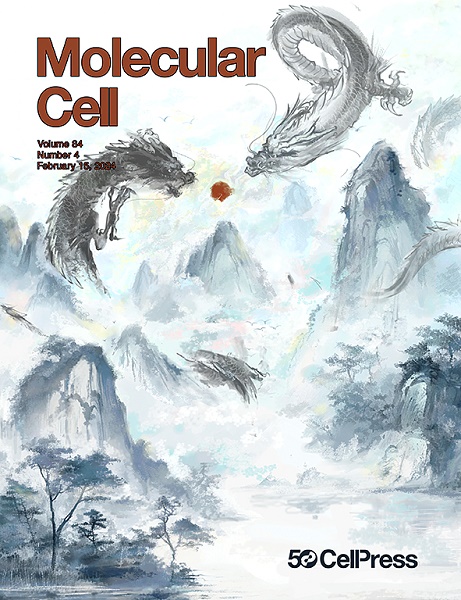SLC25A45 is required for mitochondrial uptake of methylated amino acids and de novo carnitine biosynthesis
IF 16.6
1区 生物学
Q1 BIOCHEMISTRY & MOLECULAR BIOLOGY
引用次数: 0
Abstract
Methylated amino acids accumulate upon the degradation of methylated proteins and are implicated in diverse metabolic and signaling pathways. Disturbed methylated amino acid homeostasis is associated with cardiovascular disease and renal failure. Mitochondria are core processing hubs in conventional amino acid metabolism, but how they interact with methylated amino acids is unclear. Here, we reveal that the orphan mitochondrial solute carrier 25A45 (SLC25A45) is required for the mitochondrial uptake of methylated amino acids. SLC25A45 binds with dimethylarginine and trimethyllysine but has no affinity for unmethylated arginine and lysine. A non-synonymous mutation of human SLC25A45 (R285C) stabilizes the carrier by limiting its proteolytic degradation and associates with altered methylated amino acids in human plasma. Metabolic tracing of trimethyllysine in cancer cells demonstrates that SLC25A45 drives the biosynthesis of the key amino acid derivative, carnitine. SLC25A45 is therefore an essential mediator of compartmentalized methylated amino acid metabolism.

SLC25A45是线粒体摄取甲基化氨基酸和从头肉碱生物合成所必需的
甲基化氨基酸在甲基化蛋白的降解过程中积累,并参与多种代谢和信号通路。甲基化氨基酸稳态紊乱与心血管疾病和肾衰竭有关。线粒体是传统氨基酸代谢的核心加工中心,但它们如何与甲基化氨基酸相互作用尚不清楚。在这里,我们发现孤儿线粒体溶质载体25A45 (SLC25A45)是线粒体摄取甲基化氨基酸所必需的。SLC25A45与二甲基精氨酸和三甲基赖氨酸结合,但与未甲基化的精氨酸和赖氨酸没有亲和力。人类SLC25A45 (R285C)的非同义突变通过限制其蛋白水解降解来稳定载体,并与人类血浆中甲基化氨基酸的改变有关。癌细胞中三甲基赖氨酸的代谢追踪表明,SLC25A45驱动了关键氨基酸衍生物肉碱的生物合成。因此,SLC25A45是区隔化甲基化氨基酸代谢的重要介质。
本文章由计算机程序翻译,如有差异,请以英文原文为准。
求助全文
约1分钟内获得全文
求助全文
来源期刊

Molecular Cell
生物-生化与分子生物学
CiteScore
26.00
自引率
3.80%
发文量
389
审稿时长
1 months
期刊介绍:
Molecular Cell is a companion to Cell, the leading journal of biology and the highest-impact journal in the world. Launched in December 1997 and published monthly. Molecular Cell is dedicated to publishing cutting-edge research in molecular biology, focusing on fundamental cellular processes. The journal encompasses a wide range of topics, including DNA replication, recombination, and repair; Chromatin biology and genome organization; Transcription; RNA processing and decay; Non-coding RNA function; Translation; Protein folding, modification, and quality control; Signal transduction pathways; Cell cycle and checkpoints; Cell death; Autophagy; Metabolism.
 求助内容:
求助内容: 应助结果提醒方式:
应助结果提醒方式:


